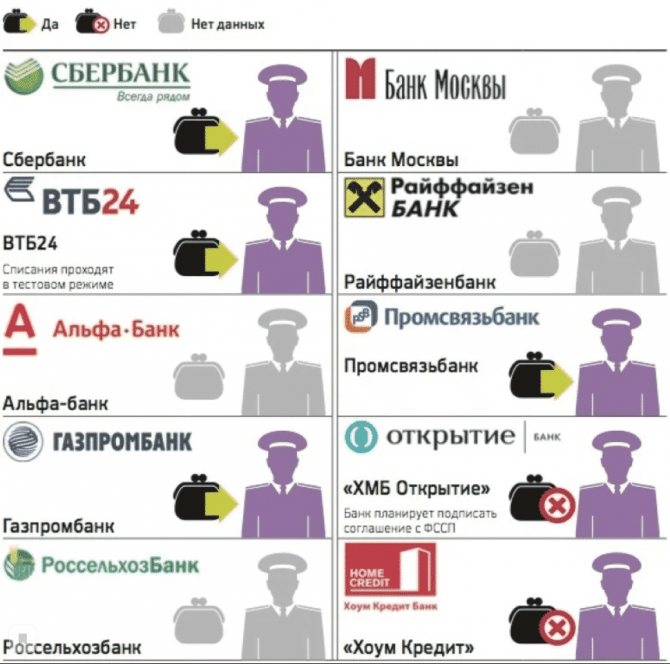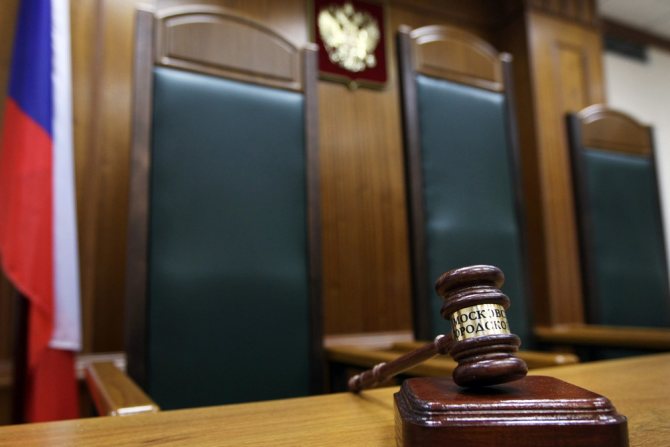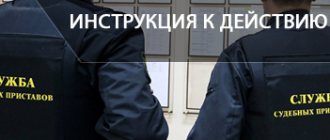List of Banks That Do Not Cooperate with Bailiffs Reviews 2020
- small commercial establishments, since requests are sent primarily to large and government organizations;
- electronic payment systems, since online wallets are very difficult to track. In fact, at the end of 2020, more than 100 banking and credit organizations had already signed a corresponding agreement on full document flow in the FSSP. Attention The list of such companies is expanding almost daily. A citizen can try to determine which specific banks bailiffs most often work with and where they primarily send requests. Such institutions include Sberbank, VTB24, Gazprobank.
Through a dedicated Internet channel, information is exchanged and funds are automatically written off from accounts to pay off existing debts. The list of organizations connecting to the system is constantly growing. A citizen can try to determine which specific banks bailiffs most often work with and where they primarily send requests.
Which banks do bailiffs work with in 2020?
According to the latest news from the State Duma, the FSSP reform in 2020, in addition to its positive impact, will have some disadvantages. The main concern is the reduction of staff and the expansion of powers of the remaining employees. To fully regulate the activities of employees, as well as to purchase basic equipment for the exercise of official powers and wages of employees, a very impressive amount will be spent.
Sberbank was the first to sign such an agreement, which is why the most complaints from its clients can be found in the public domain. VTB24 is doing the same thing: the mechanism is being worked out on the basis of the Presnensky Department of the Federal Bailiff Service of Russia in Moscow, Deputy Director of the Operations Department of VTB24 Valery Mendus told reporters. The connection of other large banks with state participation is not far off.
List of banks that work with bailiffs
The leadership of the capital's department of the Federal Bailiff Service (FSSP) announced plans to connect all the country's banks to a system for automatically debiting funds from debtors' bank cards. Until recently, money was written off only from debtors at Sberbank, but bailiffs have already reported on the connection of the Bank of Moscow and VTB24 to the system. The head of the capital's FSSP department, Alexander Stebakov, spoke about plans to expand the system of automatic debiting of funds from bank cards of debtors.
Bailiffs are planning to expand the program of automatic debiting of funds from debtors’ bank cards. As Deputy Director of the Federal Bailiff Service of the Russian Federation Tatyana Ignatieva told M24.ru, this year, in addition to Sberbank, VTB24 and Bank of Moscow will connect to the system. The head of the capital's FSSP department, Alexander Stebakov, told M24.ru that in 2014, debts in 600 thousand cases were written off electronically. “We have several projects on electronic foreclosure.
How to protect yourself from such situations
You can protect yourself from blocking your bank cards if you receive information about your debt in a timely manner and pay it off on time. In this case, you definitely won’t have to look for the answer to the question – which bank cards cannot be seized by bailiffs. The official website of the FSSP tracks the debts of all citizens to the state and its citizens. To view, you just need to enter your details.
And one more piece of advice. Don't panic! There are different situations in life, you have to look for a way out. In extreme cases, no one will be left completely without money, since they have no right to withhold more than 50% of the income from the account to which wages are credited.
0
Author of the publication
offline 17 hours
Which banks do not work with bailiffs
So, how is this procedure performed? Bailiffs look for debtors' bank accounts in the following way: an application to search for the debtor's accounts is submitted. This application is sent to all financial institutions. But since there are quite a large number of credit institutions on the territory of the Russian Federation, it is likely that the request will not reach everyone.
The larger the bank, the higher the likelihood that it will receive a corresponding request and, upon first request, provide all the information necessary to the bailiffs, and subsequently write off the funds from the debtor’s account. Sberbank undoubtedly takes the lead among all banks actively cooperating with bailiffs. If legal proceedings are initiated against a person, as a result of which a fine is imposed, then the funds from the Sberbank account of such a citizen will be written off with almost 100% probability.
We recommend reading: Non-Name Card and Bailiffs
Can wages be written off?
Then brief information about enforcement proceedings can be viewed on the FSSP website. There is also a production number, a number of the enforcement document and the name of the bailiff who is conducting the enforcement proceedings.
All that remains is to compare the details: according to such and such a writ of execution, such and such a bailiff initiated proceedings and, within the framework of this proceedings, wrote off such and such an amount.
There is no need to freeze the account if you can and should simply take the money and transfer it to the creditor. The ultimate goal of the bailiff is to do what is stated in the writ of execution. That's why he is an employee of the enforcement agency.
To do this, in the accounting department at work you need to get a certificate from work stating that such and such a salary is transferred to such and such an account. And at the bank - an account statement, from which it is clear that the salary is being received.
After this, the bailiff must remove the seizure from the account and send a decree to the debtor’s place of work to withhold 50 or 70% of the salary.
Which banks cooperate with bailiffs list 2020
Failure to provide the information requested by the executive body within seven days may result in a fine. Therefore, when finding out which banks do not provide information to bailiffs, we can say with confidence that if a request is received, not a single credit organization, commercial or government, has the right to hide such information if there is a court order to search for the debtor’s accounts.
Bailiffs are establishing close ties with banks throughout the country. As the RG was recently told by the Federal Work of Bailiffs, a pilot project for the exchange of information electronically with one of the commercial banks was launched in St. Petersburg last season. In addition, an electronic communication was established in the Irkutsk region with the Savings Bank.
Which banks cooperate with bailiffs in 2020
Bailiffs began to block debtors' accounts via electronic channels. Bailiffs established direct contacts with banks in order to write off money directly from debtors' receipts. In the Tver region, a man who owed 100 thousand rubles fell into the ground.
- about whether the debtor has open accounts and the amount of funds in rubles or other currencies;
- about storage of any other valuables.
- with small commercial banks, because requests are sent to large credit organizations first;
- with payment systems, because electronic wallets in Russia are difficult to track.
- in foreign currency, if the money in the account in rubles is sufficient to satisfy the claims of creditors;
- located in the accounts of the referendum fund;
- stored in a special election account.
Beginning of the experiment
Knowing the fact that FSSP employees search for debtors’ accounts “manually”, that is, they send requests to banks “manually”; there are no programs for this, we figured out how to conduct our experiment.
For the purity of the experiment, we contacted him and decided to issue cards for him in the amount of 2000 rubles to check whether the account would be seized or not.
The experiment lasted 10 days, during which our tester made purchases.
From all the variety of banks and payment systems, we chose several rather original organizations for the experiment.
Since our tester should under no circumstances use debit bank cards, or rather, bank accounts, because everything that is transferred to them will be instantly seized and written off by the bailiffs, we went to the stores of mobile operators, which also provide card issuing services.
Our test debtor was able to easily use the Mastercard from Megafon, make purchases in stores and top up his account, and you can also withdraw cash from the virtual card at an ATM.
You can store small funds on the card and use it for ease of travel on the subway, trains, minibuses and small purchases.
We invite you to read: Alimony and refusal to issue a court order
All banks in the Russian Federation provide all information to the FSSP; there is no way for a debtor to protect his funds in the accounts of any bank in the Russian Federation from seizure.
The result of the experiment really confirmed that “anti-bailiff” cards still exist with minor reservations.
Which banks do not cooperate with bailiffs?
A citizen can try to determine which specific banks bailiffs most often work with and where they send requests first. Such institutions include Sberbank, VTB24, Gazprobank. Another significant point is that only an organization that has the right to do so can exercise the right to collect debt from the debtor’s account. To do this, you will need to enter a special register created by employees of the Federal Bailiff Service.
The procedure for the bailiff's actions is quite standard and is prescribed in the current legislation. First of all, seizure is imposed on bank accounts. Moreover, funds are equally debited from accounts in rubles or in foreign currency. Some citizens, knowing that they have debt, try to avoid such a measure of influence and are interested in the question of which banks do not cooperate with bailiffs in 2020. Today we will try to give a clear answer and explain the situation with the arrest of accounts.
Electronic wallets
Today, many citizens have come to this format for storing and using their money. The easiest way is to issue a Yandex Money card on an unidentified account. There are some restrictions, for example, you cannot cash out more than 5,000 rubles per day, or you will have to pay a large commission, but they are not too significant, since the card can be used non-cash without restrictions.
A good option is to order a Qiwi card. It is also linked to an electronic wallet by phone number and performs all the functions of a regular debit card. To open any of the cards, you need to pay 200-300 rubles one-time, and then use this financial instrument for three years without restrictions.
We invite you to read: Additional terms and conditions of the employment contract examples
Money in an electronic account can indeed be seized or collected to pay off a debt if the bailiffs establish its ownership, but only by court decision.
That is, if an electronic wallet is identified (linked to the debtor), there are already precedents for the arrest of electronic wallets.
Seizure is a temporary prohibition to dispose of either the entire balance of a wallet or a specific amount.
• court – in order to secure a claim in a civil case. Such arrest is lifted by the same or a higher court;
• investigative authorities during criminal proceedings - with the sanction of the court. To lift the seizure, the owner of the wallet must go to court to appeal the decision;
• bailiff. Removed by a bailiff or as a result of a successful appeal in court.
• a judicial act that has entered into force in a civil or criminal case (including a settlement
agreement that is not being fulfilled);
• a resolution to bring the owner of the wallet to administrative or tax
liability in the form of a fine;

• notarial writ of execution – for transactions providing for “indisputable recovery” (for example, a loan agreement from another person or company certified by a notary).
So, we registered an electronic wallet (QIWI-Wallet) for our debtor.
According to Art. 128 of the Civil Code of the Russian Federation, such property cannot be the object of civil law and is not subject to arrest. According to the agreement on the provision of services for storing electronic money, such funds can also be considered as an object of property law. For seizure, an inventory and seizure act will be required, along with a court order, bailiffs will need evidence to recognize that title units are a property right.
An alternative here would be to register electronic wallets in the name of trusted persons.
The money lay quietly in the subject’s account, and no one wrote it off.
Which banks do bailiffs work with in 2020?
The FSSP is an executive authority whose scope of activities includes organizing the implementation of judicial acts. The structure operates within the Ministry of Justice. And in this article we will look at what changes await this service in 2020. In 2020, the president initiated the development of a completely new bill in the field of enforcement proceedings.
- about storage of any other valuables.
- about whether the debtor has open accounts and the amount of funds in rubles or other currencies;
- with payment systems, because electronic wallets in Russia are difficult to track.
- with small commercial banks, because requests are sent to large credit organizations first;
- in foreign currency, if the money in the account in rubles is sufficient to satisfy the claims of creditors;
- located in the accounts of the referendum fund;
- stored in a special election account.
Procedure for seizing funds from the defendant’s accounts
The FSSP is an executive body that is responsible for the enforcement of court decisions against citizens of the country and legal entities. The main measure of primary recovery when the plaintiff applies to the bailiffs is to block the debtor’s money in the accounts, and it occurs in the following order:
- First of all, the creditor receives a writ of execution, which is issued on the basis of a court decision.
- Next, he can try to independently fulfill the will of the court and obtain voluntary payment of the debt from the defendant by presenting him with this document.
- If this measure does not work, he submits the sheet to the FSSP, and they initiate enforcement proceedings to begin debt collection.
- The bailiffs make a request to the banking institution whose client is the defendant and, having discovered funds in the account, demand that the bank block it.
- Quite often, a writ of execution is replaced by a court order, which is issued in an expedited manner if the debtor’s guilt has been established in advance, and if the defendant does not cancel it within the period prescribed by law, then it comes into force.
Important! Since 2012, bank employees have signed a special document when applying for a job, which does not allow them to disclose in favor of the defendant the intentions of the bailiffs to block accounts so that they do not have time to cash them out.

Trial
List of Banks That Do Not Cooperate with Bailiffs Reviews 2020
The powers to automatically write off debts for banks appeared a long time ago, back in 2007, but since the entry into force of the relevant legislative norm it has practically not been used, because banks were previously not willing to cooperate with the FSSP. Which banks' accounts cannot be seized?
- small commercial establishments, since requests are sent primarily to large and government organizations;
- electronic payment systems, since online wallets are very difficult to track. In fact, by the end of 2020, more than 100 banking and credit organizations had already signed a corresponding agreement on full document flow in the FSSP. The list of such companies is expanding almost daily.
- housing that is owned by the debtor and is the only one;
- items necessary for ordinary human life: dishes, clothing, etc.;
- property used for work;
- things belonging to family members;
- other property prohibited from confiscation by law.
- amounts received in compensation for damage caused to health;
- funds received in connection with the loss of a breadwinner;
- funds received in connection with injuries, wounds, injuries acquired during the performance of official duties;
- compensation payments to victims of man-made disasters;
- compensation payments for travel, treatment for certain categories of citizens;
- compensation payments to workers, incl.
What to do if your salary card is seized?
In the minds of many, if the court has already issued a writ of execution to a citizen, then the end of the problems has come. But, as it turns out, in reality everything is different: the court decision must still be executed by the bailiffs, and this is where difficulties may arise again.
Sometimes it turns out that the citizen has already provided the bailiffs with the necessary documents, but the bailiffs hesitate to collect the debt. Moreover, such incidents occur quite often, despite the legal right to protection by the court, according to which decisions are always enforceable. But such a situation can sometimes cause significant damage to a citizen’s budget and even undermine the well-being of an entire family.
What to do in this case? You should not start by writing a complaint; first try to establish contact with the bailiff by visiting him and addressing your problem.
We invite you to read: What is the difference between a memo and a report?
If you were unable to reach the servant of Themis, then within ten days from the moment of recording the inaction you can file a complaint with one of the following authorities:
- Arbitration court. Legal entities can complain here about delays and inaction.
- Court of general jurisdiction. Individuals can turn to this authority for help.
- Prosecutor's office. By decision of the prosecutor's office, a bailiff found to be incompetent on an issue can be summoned to court, which, you see, is quite effective.
It is also possible to appeal to a higher official, who must also consider it within thirty days. However, this method is considered the most ineffective, one of the reasons is the boss’s disinterest in recognizing the inaction of his ward. However, the very fact of filing this complaint can be used when seeking help from other authorities.
The only accounts that will not be touched are social ones. They are not charged a tax, and no one has the right to freeze or seize this account, that is, if you receive assistance from the state - disability benefits or pensions, including for the military, assistance with a child - disabled person and child benefits, such bank cards are completely safe.
The arrest looks like this:
- after the verdict is passed, the debtor is given a short time to repay the debt on his own;
- if this does not happen, the writ of execution is sent straight to the bailiffs;
- they, in turn, transmit the resolution to the bank where the debtor is registered with a request to block the account;
- The bank fulfills this requirement - closes the account, blocks the bank card or imposes restrictions on the use of funds, forcibly writing off the required amount as debt repayment.
This applies only to those funds that were credited to the account after the court verdict. Those amounts that were previously on the card can all be written off to pay off the debt. Which banks cannot have bailiffs seize accounts? The question here is rather that there are a lot of banks in the country, and it is physically impossible to send requests to thousands of banks in order to find all the debtor’s accounts.
Therefore, there is a 50/50 chance that the bailiffs will not find out where the borrower’s funds are kept. And this can be facilitated, for example, if a person managed to take out a loan not in the same region where he is registered or lives. Or taking a loan from a not-so-popular bank in the country. However, this is not a “cure” or a means of protection against blocking of “all-seeing” bailiffs.
Which banks cooperate with bailiffs in 2020
Which banks do not work with bailiffs Upon a request received from the public service, any bank or credit institution is required to provide reliable information containing information:
- about whether the debtor has open accounts and the amount of funds in rubles or other currencies;
about storage of any other valuables.
Challenging the results of property valuation.
rub.
- located in the accounts of the referendum fund;
stored in a special election account.
For reference: restrictions on the withdrawal of money from referendum funds and special election accounts were introduced only in March 2020.
How does the process of writing off money from a card by bailiffs take place?
To legally debit money from an individual’s debit card, bailiffs must act according to the following scenario:
- Obtaining the appropriate resolution after court proceedings;
- Sending official requests to financial organizations;
- Receiving response information about the debtor’s cards and accounts;
- If there is money in the account, send an official request for debiting;
- Transfer of a transaction by a bank without the participation of the client after verification.
Read The bank sued over the loan. What to do?
Which banks do bailiffs work with in 2020?
According to the latest news from the State Duma, the FSSP reform in 2020, in addition to its positive impact, will have some disadvantages. The main concern is the reduction of staff and the expansion of powers of the remaining employees. To fully regulate the activities of employees, as well as to purchase basic equipment for the exercise of official powers and wages of employees, a very impressive amount will be spent.
Often, credit organizations resort to the services of collection agencies that buy out debt at a minimum cost. These organizations operate in Russia completely legally. Not all debt is of interest to collectors, but only that which, firstly, can be returned, and secondly, from the return of which a profit can be made. As a rule, banks do not sell individual products, but form a kind of portfolio of several products, and then sell them to the company that offers the highest price.
Which banks do bailiffs not work with?
According to some reports, the government intends not to limit itself to this figure, but to increase wages to 100% for 2020 - 2020. Another significant point is that only an organization that has the right to do so can exercise the right to collect debt from the debtor’s account.
We are talking about the following means: savings in foreign currency, provided that ruble savings are sufficient to pay the debt and satisfy claims; money held in the referendum fund accounts; funds deposited in a special election account.






